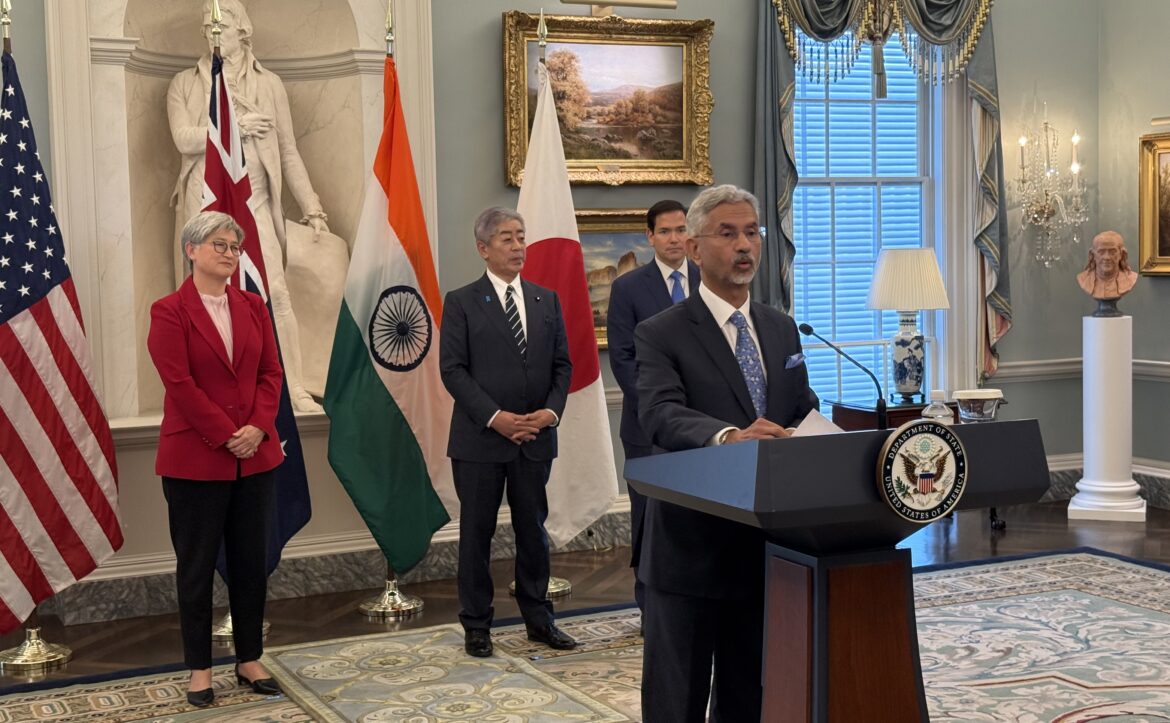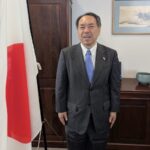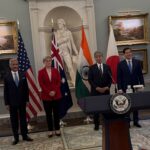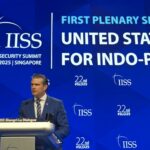As India prepares to host the upcoming Quad Leaders’ Summit in New Delhi this fall, the recently released 2024 Annual Report by the Ministry of External Affairs (MEA) provides a comprehensive overview of the country’s expanding foreign policy – from the Indo-Pacific to the Global South.
The growing momentum of India’s diplomatic engagement was on display on July 1, when U.S. Secretary of State Marco Rubio hosted a meeting of Quad Foreign Ministers in Washington D.C. India’s S. Jaishankar were Australia’s Penny Wong and Japan’s Iwaya Takeshi were in attendance. Secretary Rubio characterized the gathering as a “reaffirmation of the Quad’s evolution from dialogue to delivery.”
Highlighting the progress by the Quad in the areas of “maritime domain, logistics, education, and political coordination,” Minister Jaishankar during his remarks called the platform one for “deepening convergence and expanding common ground.”
At the Quad Leaders’ Summit in Wilmington, USA, on September 21, 2024, Prime Minister Narendra Modi joined his counterparts, President Joe Biden of the United States, Prime Minister Anthony Albanese of Australia, and Prime Minister Fumio Kishida of Japan. Together, they reaffirmed the Quad’s role as a “global force for good”, launching joint efforts across health, climate, security, infrastructure, and advanced technologies.
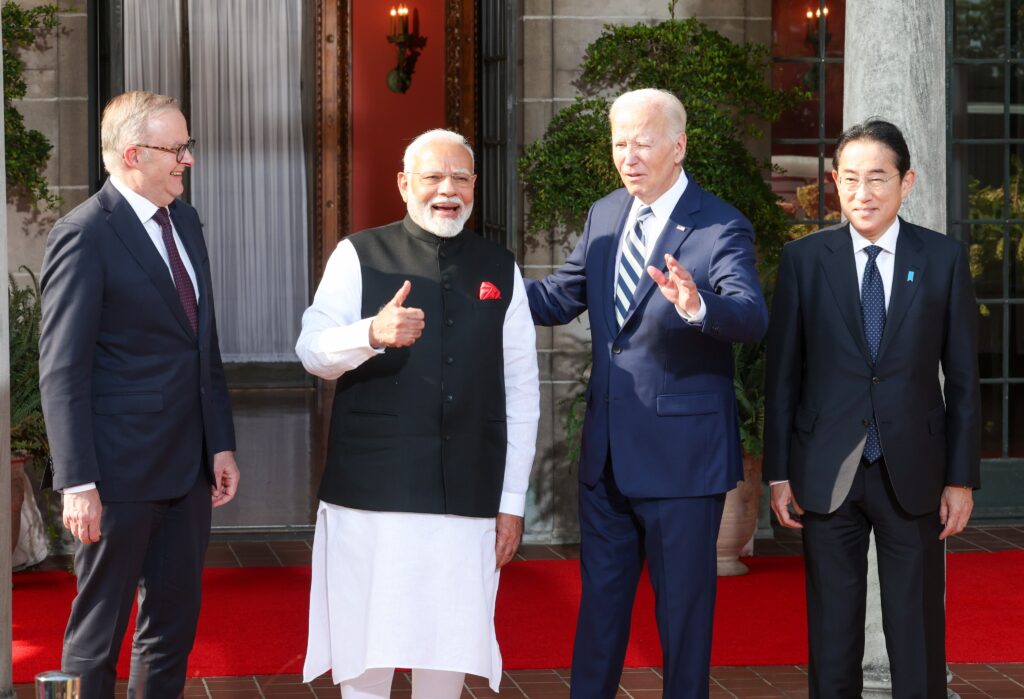
“India’s approach to the Indo-Pacific centers on advocating for a region that is free, open, inclusive, and governed by international law,” the MEA Report states. The Quad’s collective commitment to a rules-based Indo-Pacific continues to resonate beyond summit rooms. “This principle of a free and open Indo-Pacific remains Japan’s foundational commitment. All our efforts come back to that,” said Consul General of Japan in Perth, Karimata, in an interview with South Asian Herald in June.
In Wilmington, Quad leaders launched the Cancer Moonshot Initiative to fight cervical cancer, strengthened pandemic preparedness, and unveiled infrastructure projects like the Ports of the Future and undersea cable upgrades to enhance Indo-Pacific connectivity. Collaborations in AI, biotechnology, and semiconductors signaled the group’s innovation agenda.
India’s Comprehensive Global Strategic Partnership with the United States continues to deepen. As highlighted in the report, the two countries remain closely aligned through the 2+2 Ministerial Dialogue and frameworks such as the G20, I2U2, and the Quad.
India’s leadership extends far beyond the QUAD. In 2024, it remained active in the UN, G20, G7, SCO, and BRICS, with the MEA noting a year of “economic fluctuations, climate change impacts, and geopolitical tensions.”
At the G20 Summit in Rio de Janeiro, India continued its work with Brazil and South Africa under the G20 Troika, aligning on social inclusion, energy transition, and global governance reform. “This was also the first G20 Summit to include the African Union as a permanent member,” the MEA noted, a landmark initiated during India’s G20 Presidency in Delhi in 2023.
Voice of the Global South: A Growing Chorus
Building on the momentum of the 3rd Voice of the Global South Summit, held virtually on August 17, 2024, under the theme “An Empowered Global South for a Sustainable Future”, which brought together 173 dignitaries from 123 countries, including 21 Heads of State and 34 Foreign Ministers, Modi took that message on the road in 2025.
Earlier this month, PM Modi visited Ghana, Namibia, Trinidad & Tobago, and Argentina, alongside his participation in the BRICS Summit in Brazil, a move described by Indian officials as reinforcing India’s commitment to elevating South-South cooperation through diplomacy, development, and diaspora engagement.
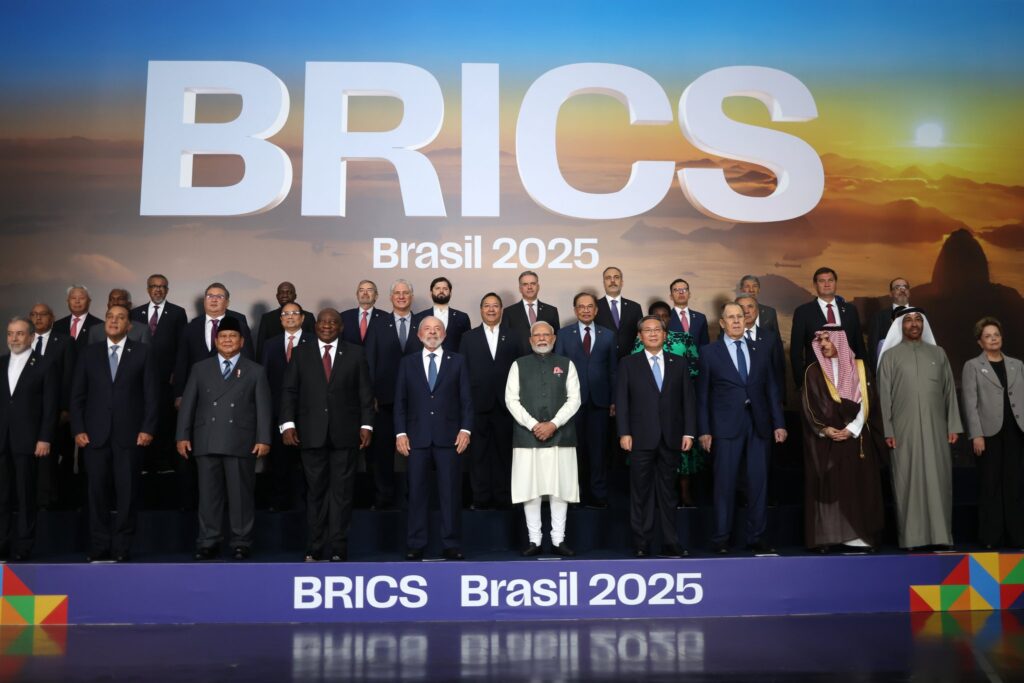
In Ghana, PM Modi met President Nana Akufo-Addo, announcing scholarships and Quick Impact Projects. “India and Ghana share not just history, but a future built on trust, technology, and talent,” Modi said in Accra. “Whether it is green energy or digital public infrastructure, our partnership will empower not just our two nations but the Global South”, he emphasized.
In Trinidad & Tobago, where over 40 per cent of the population is of Indian origin, the Prime Minister announced a historic policy: “OCI cards would now be issued to the 6th generation of the people of Indian origin in Trinidad & Tobago.” He added, “The Indian diaspora is our pride” referring to the country’s Prime Minister as a “daughter of Bihar.”
In Argentina, PM Modi received the Key to the City of Buenos Aires, marking 65 years of diplomatic ties. In Namibia, he highlighted a strategic minerals partnership: “Our partnership will shine like diamonds.” India, the world’s largest polisher of diamonds, and Namibia, a top producer, are forging a new axis of mineral diplomacy, building on recent cooperation in digital finance and humanitarian aid, as noted in the MEA Annual Report 2024.
As India sharpens its Quad vision, Australia, its key Indo-Pacific Quad partner, is stepping up on clean energy. In a strong show of collaboration, 22 Australian companies showcased cutting-edge technologies during a Clean Energy Trade and Investment Mission to India last week. Led by Austrade and timed just months ahead of the Quad Summit, the mission underscored shared priorities in decarbonization and regional energy resilience. “Australian clean energy capabilities can support India’s energy transition goals, including its target of 500 GW of non-fossil fuel capacity by 2030,” said Trade and Tourism Minister Don Farrell.
This clean energy partnership reinforces India’s broader message of inclusive diplomacy and reflects the country’s evolving foreign policy architecture for 2024–25. As the MEA Annual Report states, “India remained steadfast in expanding its strategic autonomy, championing meaningful reforms of multilateral institutions, addressing the priorities of the Global South, and safeguarding its security within the framework of the rules-based international order.”


